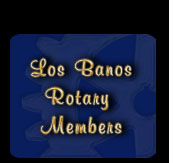




Los
Banos Rotary Club History
Traces History Of Labor Movement
William Kiser, of Modesto, representative of the American Federation of Labor Teamsters Union for Stanislaus and Merced counties, was guest speaker at the Rotary Club luncheon Tuesday noon, presenting a brief review of the labor movement generally and more specifically stressing and aims and objects of his own organization, which is the largest in the country.
The labor movement, he said, is almost as old as America. The first labor union was established by shoemakers in Philadelphia in 1792. The first organization on a group basis such as we know today was established in 1827 by Philadelphia steel workers.
One of labor's first big struggles, Kiser said, was to establish a 10-hour working day—a move that was fought vigorously by business and farmers alike, who feared that such a minimum working day might establish a precedent for all working people.
He credited Samuel Gompers, first president of the A.F.ofL., as being responsible for much of the organizational foundation of the labor movement as it is known today, also for the general philosophy as based on the economic front.
Commenting on the Wagner Act, Kiser praised the act for the recognition of the right to organize without discrimination as far as labor is concerned; but said there are numerous flaws in the act as presently instituted which deprives the activities of working people to some degree.
Kiser condemned the activities of radical labor leaders, and stated the AFL would condone no such leadership, nor permit any "isms" to permeate its ranks. AFL, he said, is pledged to work solidly for the perpetuation of the U.S. Constitution and to help build and maintain the principles of this free democracy.
Praising the proposed local school bond issue at a further step for the benefit of the laboring man Kiser said his group was among the first to advocate and work for the free public school system. No good citizen, he said, can honestly oppose such a bond issue, because it is necessary for the development of tomorrow's citizens, and as such, isn't to be denied.
The speaker was introduced by Frank Peluso, program chairman.
January 10, 1950
Los Banos Enterprise, Rotary Club 585 & Memorable Places Web Design of Los Banos


